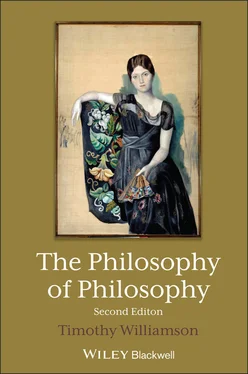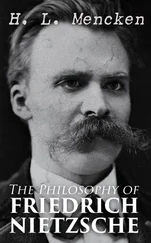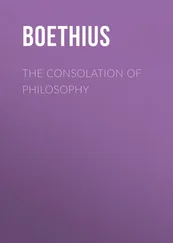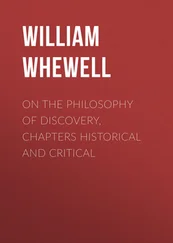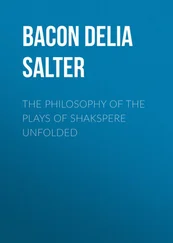Although three-valued and fuzzy logicians reject both the answer “Yes” and the answer “No” to the original question, they do not reject the question itself. What they reject is the restriction of possible answers to “Yes” and “No.” They require a third answer, “Indefi-nite,” when the queried sentence takes the value I. More formally, consider the three-valued table for the sentence operator Δ, read as “definitely” or “it is definite that”:
Even for fuzzy logicians this table constitutes a complete semantics for Δ, since the only output values are T and F, which determine unique degrees of truth (1 and 0). A formula of the form ¬Δ A & ¬Δ ¬ A(“It is neither definitely so nor definitely not so”) characterizes a borderline case, for it is true if Ais indefinite and false otherwise. In response to the question A?, answering “Yes” is tantamount to asserting A, answering “No” is tantamount to asserting ¬A, and answering “Indefinite” is tantamount to asserting ¬Δ A & ¬Δ ¬A. On the three-valued and fuzzy tables, exactly one of these three answers is true in any given case; in particular, the correct answer to the original question is “Indefinite.”
On the three-valued and fuzzy approaches, to answer “Indefinite” to the question “Is Mars dry?“ is to say something about Mars, just as it is if one answers “Yes” or “No.” It is not a metalinguistic response. For Δ is no more a metalinguistic operator ¬than is. They have the same kind of semantics, given by a many-valued truth-table. Just as the negation ¬Ais about whatever Ais about, so are Δ Aand ¬Δ A & ¬Δ ¬A. Thus the answer “Indefinite” to the original question involves no semantic ascent to a metalinguistic or metaconceptual level. It remains at the level of discourse about Mars.
The three-valued and fuzzy approaches have many suspect features. For instance, they treat any sentence of the form Δ Aas perfectly precise, because it always counts as true or false, never as indefinite, whatever the status of A; thus ΔΔA ∕ Δ ¬Δ A(“It is definite whether it is definitely so”) is always true. This result does not fit the intended ∨interpretation of Δ. For “Mars is definitely wet” is not perfectly precise. Just as no moment is clearly the last on which Mars was wet or the first on which it was not, so no moment is clearly the last on which it was definitely wet or the first on which it was not definitely wet. Just as it is sometimes unclear whether Mars is wet, so it is sometimes unclear whether it is definitely wet. This is one form of the notorious problem of higher-order vagueness: in other words, there are borderline cases of borderline cases, and borderline cases of borderline cases of borderline cases, and so on. The problem has never received an adequate treatment within the framework of threevalued or fuzzy logic; that it could is far from obvious. 9
Some philosophers, often under the influence of the later Wittgenstein, deny the relevance of formal semantic theories to vague natural languages. They regard the attempt to give a systematic statement of the truth conditions of English sentences in terms of the meanings of their constituents as vain. For them, the formalization of “Mars was always either dry or not dry” as ∀t (Dry(m,t)∕ ¬ Dry(m,t))is already a mistake. This attitude suggests a premature and slightly facile pessimism. No doubt formal semantics has not described any natural language with perfect accuracy; what has not been made plausible is that it provides no deep insights into natural languages. In particular, it has not been made plausible that the main semantic effects of vagueness are not susceptible to systematic formal analysis. In any case, for present purposes the claim that there can be no systematic theory of vagueness is just one more theory of vagueness, although – unless it is self-refuting – not a systematic one; it does not even answer the original question. Even if that theory were true, the other theories of vagueness, however false, would still exist, and would still have been accepted by some intelligent and linguistically competent speakers.
This is no place to resolve the debate between opposing theories of vagueness. The present point is just that different theories support contrary answers to the original question. All these theories have their believers. Any answer to the original question, positive, negative, or indefinite, is contentious. Of course, if everyone found their own answer obvious, but different people found different answers obvious, then we might suspect that they were interpreting the question in different ways, talking past each other. But that is not so: almost everyone who reflects on the original question finds it difficult and puzzling. Even when one has settled on an answer, one can see how intelligent and reasonable people could answer differently while understanding the meaning of the question in the same way. If it has an obvious answer, it is the answer “Yes” dictated by classical logic, but those of us who accept that answer can usually imagine or remember the frame of mind in which one is led to doubt it. Thus the original question, read literally, has no unproblematically obvious answer in any sense that would give us reason to suspect that someone who asked it had some other reading in mind.
Without recourse to non-literal readings, some theorists postulate ambiguity in the original question. For example, some three-valued logicians claim that “not” in English is ambiguous between the operators ¬(strong negation) and ¬Δ(weak negation): although ¬Aand ¬ Δ Ahave the same value if Ais true or false, ¬Δ Ais true while ¬ Ais indefinite if Ais indefinite. While A∕ ¬ A(“It is so or not so”) can be indefinite, A∕ ¬Δ A(“It is so or not definitely so”) is always true. On this view, the original question queries ∀t (Dry(m, t)∕ ¬ Dry(m, t))on one reading, ∀t (Dry(m, t)∕ ¬Δ Dry(m, t))on another; the latter is true (Mars was always either dry or not definitely dry) while the former is indefinite. Thus the correct answer to the original question depends on the reading of “not.” It is “Indefinite” if “not” is read as strong negation, “Yes” if “not” is read as weak negation. Although the threevalued logician’s reasoning here is undermined by higher-order vagueness, that is not the present issue. 10
If ‘not’ were ambiguous in the way indicated, it would still not follow that the dispute over the original question is merely verbal. For even when we agree to consider it under the reading of ‘not’ as strong negation, which does not factorize in the manner of ¬Δ, we still find theories of vagueness in dispute over the correct answer. We have merely explained our terms in order to formulate more clearly a difficult question about Mars.
Still, it might be suggested, the dispute between different theories of vagueness is verbal in the sense that their rival semantics characterize different possible languages or conceptual schemes: our choice of which of them to speak or think would be pragmatic, based on considerations of usefulness rather than of truth. Quine defended a similar view of alternative logics (1970: 81–6).
Читать дальше
